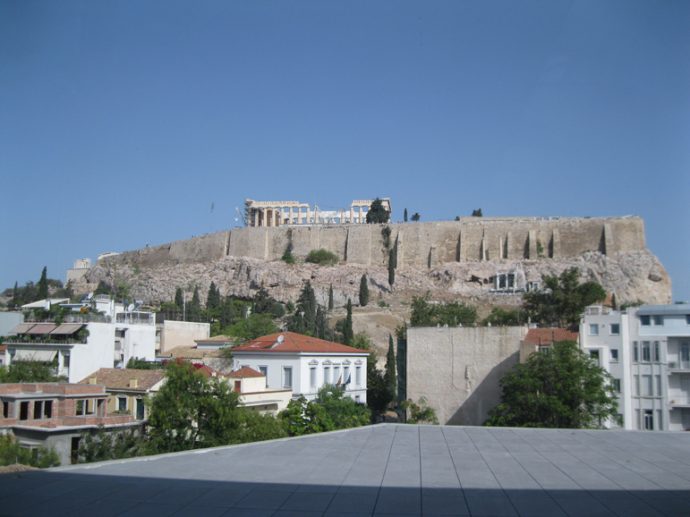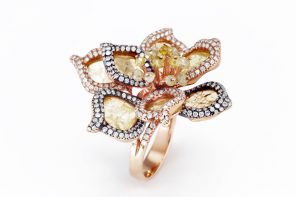Although he was short of money, Alexander did not want to leave his men without financial resources. He enquired very carefully into their circumstances, and if they were in need, he made them generous gifts….
Seeing his lavish generosity, one of (his counselors) cried out: “My lord…what do you think will be left to you?”
“Hope,” was Alexander’s unhesitating reply….
He was taking very little baggage with him. His weapons, the trappings of his horses — Bucephalus, somewhat aged but still vigorous, was among them — and especially a small casket which… contained Homer’s ‘Iliad.”
— from Pierre Grimal’s “Stories of Alexander the Great”
Unlike Alexander — whose conquest of the Persian Empire in 331 B.C. ignited the spread of Greek culture and a tension between East and West that resonates today — I had a lot of baggage, not all of it actual. Commitments on the home and work fronts weighed heavily, as did my lingering fear of flying. Oh, the irony: Here was a man who traveled some 22,000 miles from the Balkans to India and I was reluctant to journey less than a fourth of that to immerse myself in his complex story, which has haunted me since childhood.
Yet Alexander was nothing if not persistent. “My son, you are invincible,” the Oracle at Delphi legendarily proclaimed, exasperated when he dragged her from her chamber for a reading about his Persian prospects. And so I set out to chart “The Legacy of Alexander the Great” through Times Journeys with a sophisticated, completely collegial group of American professionals in the culturally rich, financially troubled land that hails him as hero and favorite son.
Led by David Ratzan, the ebullient, erudite head librarian at the Institute for the Study of the Ancient World at New York University, and Eleni Zachariou, the passionate, expert Greek tour manager, we followed Alexander from Athens in the south to Macedonia, the northern Greek region that was his misty highland home. If that sounds less epic than his Persian quest, it was perhaps more timely as we continually weighed Greece’s glorious past as the cradle of Western civilization against its present socioeconomic challenges.
WEST, MEET EAST
“We draw on our classical past in good times and in bad,” said one government official, who like other Greek professionals spoke to me but not for attribution, patronage being a key to employment there.
At present those times are a mixed bag. The unemployment rate is at 25 percent, with youth unemployment 10 points higher. Some 400,000 millennials have departed for jobs in the rest of the European Union, creating a brain drain that may have far-reaching consequences.
In steep, teeming Athens, for which Alexander partly waged a war of revenge on Persia, undocumented young men lined up outside an office on a Monday morning, looking for work. In Thessaloniki — Greece’s second largest city, named for one of Alexander’s younger half-sisters — striking bus drivers ceded the boulevards and squares lined with palms and terraced, cream-colored apartments to cars, motorbikes, tour buses and pedestrians. An architect spoke of having less work and fewer assistants.
The reasons for the economic inertia are as varied as its examples, some observers say. They include a lack of Alexandrian leadership — leadership from the front — by the Greek government and the European Union; the aforementioned patronage system and rigid unions, which tend to keep workers in place; and a general sense of malaise. A continuing influx of job and asylum seekers doesn’t help, said Greeks and tourists alike. (Among the colorful graffiti that thread Greek cities like Thessaloniki was “No borders, no nation,” although on the ramparts of the city we also saw “Refugees welcome.”)
Zachariou, who brought both drive and warmth to her role as tour manager, said Greece’s challenges are compounded by its unique geography and history, which Alexander’s eastward quest underscored.
“How can we be only European, because we have Eastern elements?” she wondered over breakfast on the balcony of St. George Lycabettus Boutique Hotel in Athens, with its mesmerizing view of the Acropolis and the crown jewel of its temple complex, the gleaming Parthenon. “What we can do is appreciate the East and get the best of the East and the best of the West.”
Greece’s liminal position between East and West has created an unparalleled culture that we saw exquisitely arrayed across sensuous Greco-Roman ruins in Athens and Philippi; lucent, jewel-toned Byzantine churches in Thessaloniki and Veria; and sleek, modern, ever-expanding museums throughout, each a gem no matter how small. The Archaeological Site of Aigai (modern-day Vergina) alone — containing the profoundly moving tombs of Queen Eurydice, Philip II and Alexander IV, Alexander’s paternal grandmother, father and son respectively — should be on anyone’s bucket list with its panoply of marble funerary reliefs, expressive wall paintings, glittering gold caskets and crowns of gold leaves and impressive weaponry, including a magnificent Achillean shield.
PRESENT, MEET PAST
But bureaucracy can get in the way of marketing such treasures. The Archaeological Site and Museum at Pella — which succeeded Aigai as Macedonia’s capital and was Alexander’s birthplace — contains a poignant head of the conqueror as tender youth, superb floor mosaics depicting a lion hunt and the sensual wine god Dionysus and a brilliant entrance of photographic reproductions illustrating Alexander’s influence on art history. Yet the small gift shop is located in the relative no man’s land of the archaeological site. Why not put at least a main retail shop in the museum? A docent shoots us a look that suggests we’re preaching to the Greek chorus. The minister of culture wants the gift shop at the archaeological site, she said.
When you live this intimately with the past, it’s not easy to balance it with the present. At the intersection of Egnatia and Venizelou streets in Thessaloniki, we were treated to a sneak peek at a planned subway stop that’s part of a $1.1 billion, EU-funded, 13-station line similar to Honolulu’s driverless transit system. Our group joked that the stop was like Manhattan’s unending Second Avenue Subway: It has been under construction for 10 years. Part of the reason for this is a controversial plan to leave the Roman and early Byzantine artifacts unearthed there, including a marble Roman crossroads, and build the station underneath them. The station has created 1,000 jobs, many of them temporary. It has also shuttered a number of stores that may not reopen.
Nevertheless, the subway stop remains one of the economic bright spots we observed. Back at Vergina, the complex of royal tombs is expanding to include a museum that will open in two years; a park; and the royal palace, which is being restored to the extent of its perimeters and red and white mosaic floors. In Veria, a Macedonian city rich in Jewish and Byzantine influences, the bright, modern public library — which has an aquarium, a meditation room and a well-developed children’s section — is using a $1 million Access Learning Award from the Bill & Melinda Gates Foundation to expand services. And, of course, Greece continues to export its culture, with the outstanding “The Greeks: From Agamemnon to Alexander the Great” drawing a large viewership in Washington, D.C., recently while a show of Byzantine masterpieces in St. Petersburg, Russia, was part of the “2016: Greece-Russia” collaboration.
THE POWER OF A PEOPLE
Apart from its culture, Greece’s greatest asset is the indomitable spirit of its people. The Greeks wear their cares lightly — some would say too lightly in a land of siesta — with the sounds of laughter, motorbikes and plaintive accordions pealing through the night. For all their sluggish economy, the Greeks are an industrious, eager-too-please people, the waitresses standing by to ensure that they made your iced caffe latte properly — ice, and thus iced drinks, being something exotic in Europe.
The Greeks ease any of your concerns with shy smiles and phrases like “no worries” and “no problems.” Their generosity is memorable. When this reporter was left behind at the museum in Pella — that’s what I get for gabbing about gift shops — some villagers sprang into action. As two black-clad women tried frantically to wave down my departing tour bus, a man motioned for me to get in his car and took off after it.
“Close the door,” he shouted as we careened around a corner. Moments later, my smiling saviors were waving farewell, having reunited me with my group, while I felt like Lysimachus — the old tutor that Alexander once rescued when he fell behind on a march.
The ancient Greeks, particularly the Athenians, didn’t care for their Macedonian overlords — lusty, crafty Philip and his dreamy-eyed son. They saw the Macedonians as arrivistes, despite Euripides having written his last play, “The Bacchae,” in Pella and Aristotle tutoring Alexander in the serene Garden of Mieza, now a field with ruins. There tour expert Ratzan addressed us much as Aristotle might’ve done the teenage Alexander and his Companions. In nearby Naoussa, we visited the Aristotle’s School Cultural Center, a contemporary conference space, café and gift shop that lets nature in, including some spectacular, teardrop-shaped, blue juniper bushes.
Thessaloniki, of course — Alexander land — celebrates the native son with magnets, statuettes and other tchotchkes in novelty stores that dot the cityscape and with an impressive memorial. There he strides his steed Bucephalus, keeping watch over the Thermaic Gulf and, in the distance, eternally snow-capped Mount Olympus, home of the gods.
Even in Athens, Alexander has become one who in the end the people love. In the Acropolis Museum, he is represented by a marvelous classical head that sought to homogenize — and thus control — his striking, yearning features. The museum sits at the base of the Acropolis, the lofty citadel crowned by a temple complex that crystallizes the Golden Age of Greece. In 480 B.C., the Persian emperor Xerxes desecrated it, sealing Alexander’s fate. Almost 150 years later, he would send Athens 300 captive Persian shields.
On a 95-degree day, we made our own assault, climbing the Acropolis’ slippery, stony southern slope, helping one another, exhorted by guide Zachariou, who led with her bright red umbrella.
Finally, we reached the top and found ourselves surrounded by columns that were still yet dynamic in a fragile place that has nevertheless survived every invader from the Persians to the Nazis.
It was a most Alexandrian moment.





